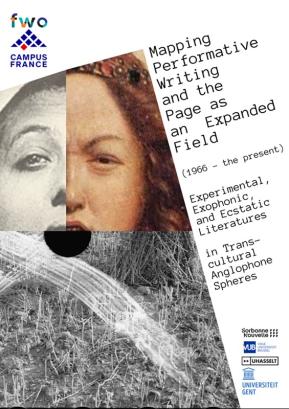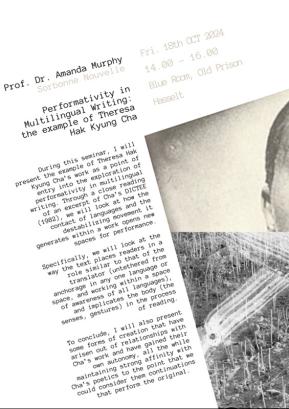CLIC warmly invites you to the seminar, Performativity in Multilingual Writing: The Example of Theresa Hak Kyung Cha, presented by Prof. Dr. Amanda Murphy (Sorbonne Nouvelle). The seminar will take place at Hasselt University on Friday, October 18th, from 14:00 to 16:00. This event is part of the FWO-Tournesol project, Mapping Performative Writing and the Page as an Expanded Field (1966–present): Experimental, Exophonic, and Ecstatic Literatures. Additional seminars are planned at VUB, with more details to follow.
If you’d like to attend, you can sign up here.
Prof. Dr. Amanda Murphy is an Associate Professor of English and Translation Studies at the Sorbonne Nouvelle University in Paris. She holds a PhD in Comparative Literature from the Sorbonne Nouvelle University and specializes in avant-garde and experimental literature and its translation. Her publications include articles on authors such as Theresa Hak Kyung Cha, Katalin Molnar, and Raymond Federman, and the forthcoming monograph Écrire, lire, traduire entre les langues: défis et pratiques de la poétique multilingue (Reading, Writing, Translating: Challenges and Practices of Multilingual Writing, Classiques Garnier, 2023). She has also published literary critiques in En attendant Nadeau and translated many works of literary criticism including Borges by Julio Premat (Vanderbilt University Press, 2021).
Performativity in Multilingual Writing: the example of Theresa Hak Kyung Cha, by Amanda Murphy
During this seminar, I will present the example of Theresa Hak Kyung Cha’s work as a point of entry into the exploration of performativity in multilingual writing. Through a close reading of an excerpt of Cha’s DICTEE (1982), we will look at how the contact of languages and the destabilizing movement it generates within a work opens new spaces for performance. Specifically, we will look at the way the text places readers in a role similar to that of the translator (untethered from anchorage in any one language or space, and working within a space of awareness of all languages), and implicates the body (the senses, gestures) in the process of reading. To conclude, I will also present some forms of creation that have arisen out of relationships with Cha’s work and have gained their own autonomy, all the while maintaining strong affinity with Cha’s poetics to the point that we could consider them continuations that perform the original.


